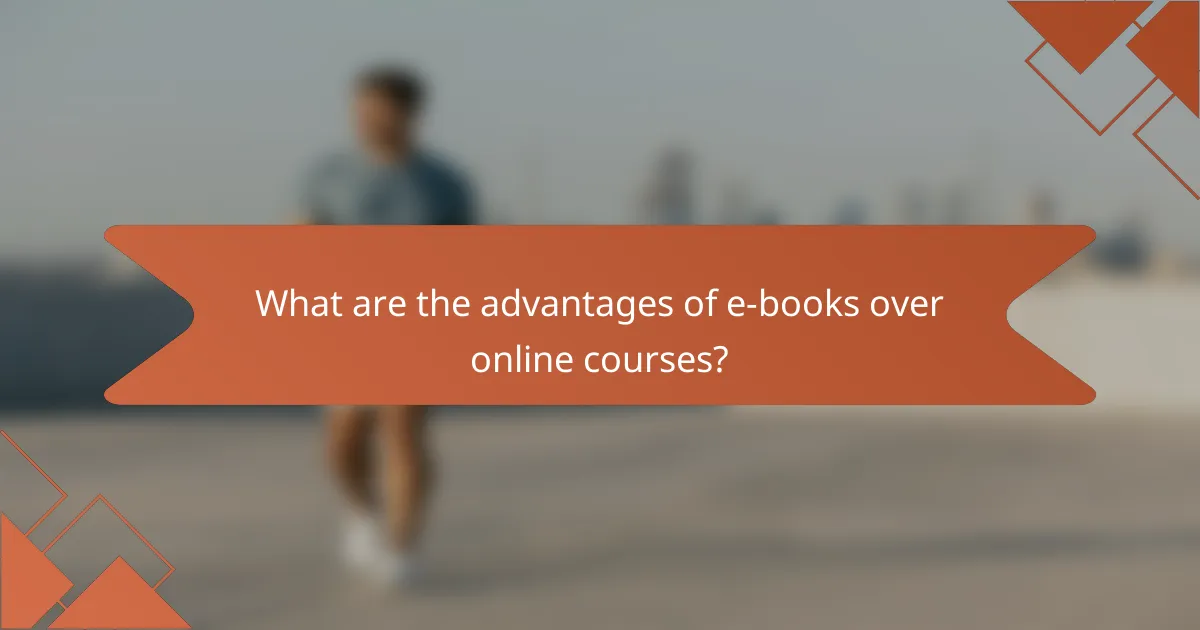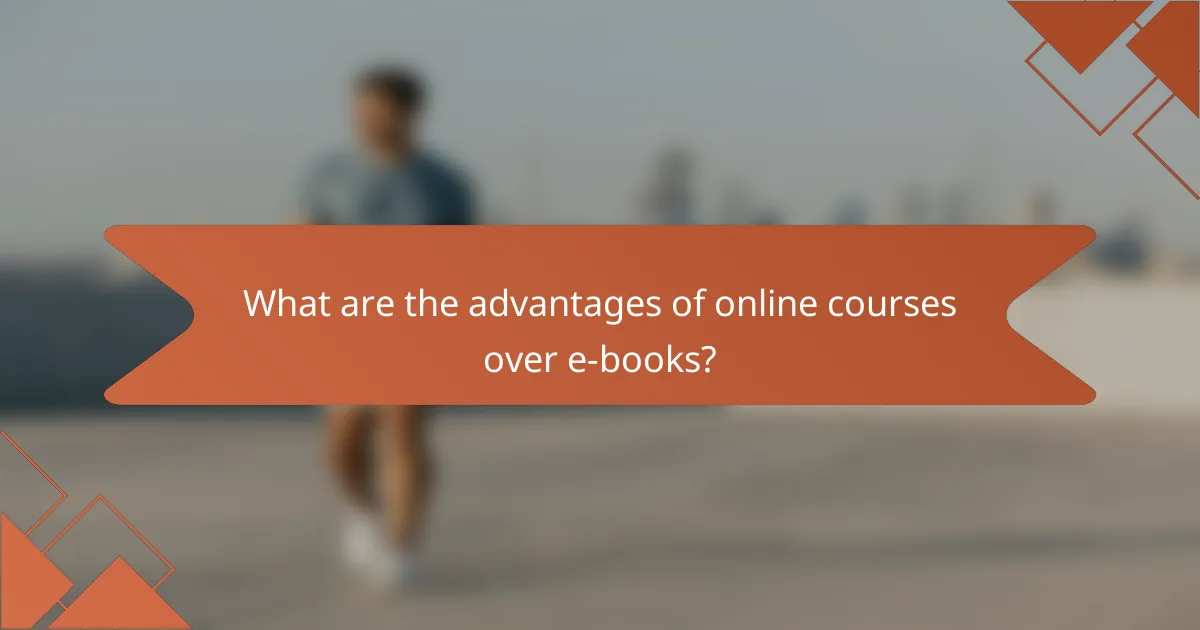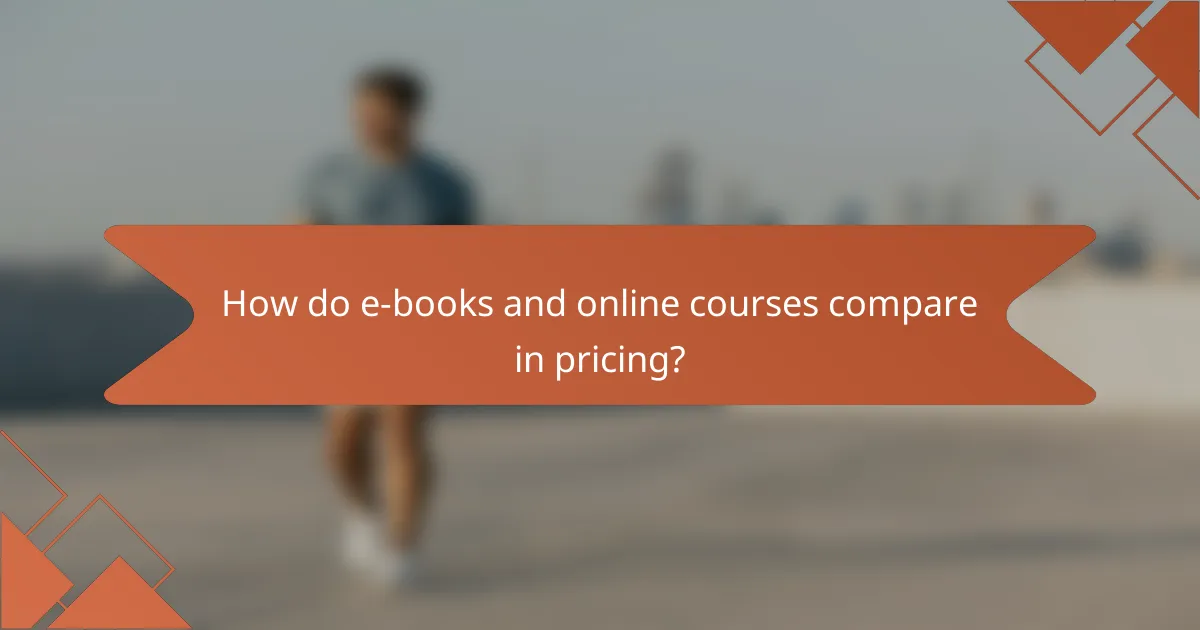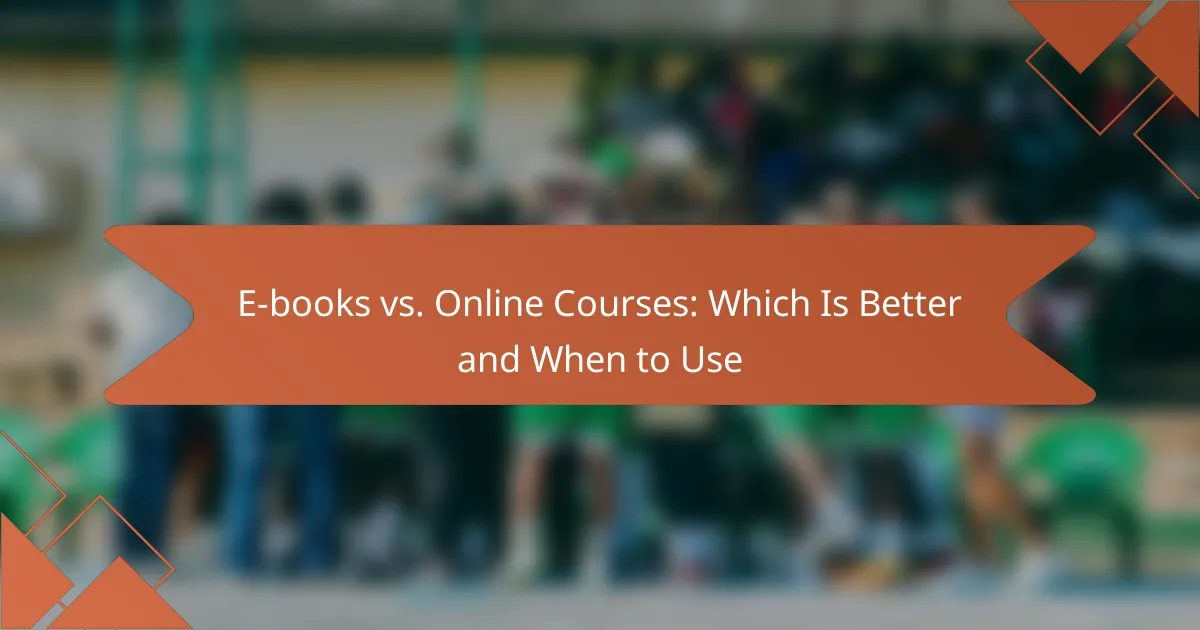In the debate between e-books and online courses, each format presents unique advantages tailored to different learning preferences. E-books provide affordability and flexibility, making them ideal for self-paced study, while online courses offer interactive experiences and structured guidance that can enhance understanding. Choosing the right option depends on your learning goals and the level of engagement you seek.

What are the advantages of e-books over online courses?
E-books offer several advantages over online courses, including lower costs, greater accessibility, and the ability to learn at one’s own pace. They are often more convenient for those who prefer reading and can be accessed anytime, anywhere.
Cost-effectiveness
E-books are generally more affordable than online courses, which often require fees for enrollment and materials. Many e-books can be purchased for a fraction of the cost of a course, making them a budget-friendly option for learners.
Additionally, e-books frequently go on sale or can be found for free through libraries or online platforms, providing even more savings. This makes them an attractive choice for individuals looking to expand their knowledge without significant financial investment.
Accessibility
E-books can be accessed on various devices, including smartphones, tablets, and e-readers, making them highly accessible. Unlike online courses that may require a stable internet connection for streaming videos or participating in live sessions, e-books can be downloaded and read offline.
This flexibility allows learners to read whenever and wherever they choose, whether they are commuting, traveling, or simply relaxing at home.
Self-paced learning
With e-books, learners have the freedom to study at their own pace. They can take the time needed to understand complex concepts without the pressure of deadlines or scheduled classes. This self-directed approach can lead to a deeper understanding of the material.
Readers can revisit sections, highlight important points, and take notes, enhancing retention and comprehension. This is particularly beneficial for those juggling multiple responsibilities or who prefer a more relaxed learning environment.
Portability
E-books are highly portable, allowing users to carry an entire library in a single device. This is especially advantageous for students or professionals who travel frequently and want to access multiple resources without the bulk of physical books.
Many e-readers and apps also allow for easy organization and search functions, making it simple to find specific information quickly, which is a significant advantage over traditional textbooks.
Variety of topics
E-books cover an extensive range of topics, often more so than online courses. Whether it’s niche subjects or mainstream interests, there is likely an e-book available to suit various learning needs and preferences.
This vast selection enables learners to explore new areas of interest or deepen their knowledge in specific fields without being limited to the curriculum of a particular course.

What are the advantages of online courses over e-books?
Online courses offer several advantages over e-books, including interactive content, structured learning paths, and direct access to instructors. These features enhance the learning experience, making it more engaging and effective for students.
Interactive content
Online courses often include interactive elements such as quizzes, simulations, and discussion forums, which help reinforce learning. This engagement can lead to better retention of information compared to passive reading of e-books.
For example, a course on coding might include coding challenges that provide instant feedback, allowing learners to apply concepts in real-time. This interactivity can motivate learners to stay committed to their studies.
Structured learning paths
Online courses typically provide a clear, structured learning path that guides students through the material in a logical order. This organization helps learners build knowledge progressively, making complex topics easier to understand.
In contrast, e-books may present information in a more fragmented way, requiring readers to navigate through chapters without a clear roadmap. A structured approach in online courses can enhance comprehension and retention.
Access to instructors
Many online courses offer direct access to instructors through live sessions, Q&A forums, or one-on-one feedback. This interaction allows students to clarify doubts and receive personalized guidance, which is often lacking in e-books.
For instance, learners can ask questions during a live webinar, ensuring they grasp challenging concepts. This support can significantly enhance the learning experience and outcomes.
Community engagement
Online courses often foster a sense of community among learners through discussion boards and group projects. This engagement allows students to share insights, collaborate, and support each other, creating a richer learning environment.
In contrast, e-books typically lack this interactive community aspect, which can lead to feelings of isolation. Engaging with peers can motivate learners and enhance their understanding of the material.
Multimedia resources
Online courses frequently incorporate various multimedia resources, such as videos, podcasts, and infographics, to cater to different learning styles. These diverse formats can make complex topics more accessible and enjoyable to learn.
For example, a course on digital marketing might include video tutorials, case studies, and interactive infographics, providing a well-rounded educational experience. This variety helps maintain learner interest and engagement throughout the course.

When should you choose e-books?
E-books are a practical choice when you need affordable, portable, and easily accessible information. They are particularly useful for self-paced learning and can be a great resource for quick reference or in-depth study.
Budget constraints
E-books often come at a lower price point compared to online courses, making them ideal for those with budget limitations. Many e-books are available for free or at a nominal cost, allowing you to access valuable information without significant financial investment.
Consider platforms like Project Gutenberg or Open Library for free e-books, or check out Kindle and other e-reader services for discounted titles. This affordability can be particularly beneficial for students or individuals seeking to expand their knowledge without incurring debt.
Quick reference needs
If you require quick access to specific information, e-books can serve as excellent reference materials. They allow you to search for keywords or phrases, making it easy to find the content you need without sifting through lengthy videos or lectures.
For instance, a technical manual in e-book format can help you troubleshoot issues efficiently, while a recipe e-book can provide instant access to cooking instructions. This immediacy can save time and enhance productivity.
Preference for reading
Choosing e-books is ideal for individuals who prefer reading as their primary mode of learning. If you find that you retain information better through text rather than audio or visual formats, e-books can cater to this preference effectively.
Additionally, e-books allow for annotations and highlights, enabling you to interact with the material in a way that suits your learning style. This can enhance comprehension and retention, making e-books a strong choice for avid readers.

When should you choose online courses?
Online courses are ideal when you need structured learning, interactive elements, and opportunities for real-time feedback. They are particularly beneficial for mastering complex subjects that require deeper understanding and practical application.
In-depth subject mastery
Online courses often provide comprehensive content that covers topics in great detail. This format allows learners to explore subjects thoroughly, which is essential for mastering complex concepts. For example, a course on data science may include modules on statistics, programming, and machine learning, ensuring a well-rounded education.
Consider courses that offer certifications or are affiliated with recognized institutions, as these can enhance credibility and provide a more rigorous learning experience. Look for programs that include assessments to gauge your understanding and progress.
Hands-on practice
Many online courses incorporate practical exercises that allow learners to apply what they’ve learned in real-world scenarios. This hands-on practice is crucial for fields like programming, graphic design, or digital marketing, where skills must be developed through application.
When selecting a course, check if it includes projects, labs, or simulations that mimic real-life tasks. Engaging in these activities can significantly enhance retention and skill acquisition, making the learning experience more effective.
Learning with peers
Online courses often facilitate interaction with other learners, which can enrich the educational experience. Collaborative projects, discussion forums, and group assignments provide opportunities to exchange ideas and gain different perspectives.
Choose courses that encourage peer engagement through live sessions or community platforms. This interaction can foster motivation and accountability, making it easier to stay committed to your learning goals.

How do e-books and online courses compare in pricing?
E-books typically have lower upfront costs compared to online courses, making them more accessible for budget-conscious learners. However, online courses often provide more comprehensive content and interactive features, which can justify their higher price point.
E-book pricing models
E-books generally follow straightforward pricing models, often ranging from free to around $30 for most titles. Many authors and publishers offer discounts or bundle deals, especially for educational content. Subscription services may provide access to a library of e-books for a monthly fee, which can be economical for avid readers.
When considering e-book pricing, look for promotions and seasonal sales, as these can significantly reduce costs. Additionally, check if your local library offers free access to e-books, which can be a cost-effective option.
Online course pricing structures
Online courses can vary widely in price, typically ranging from $10 to several hundred dollars, depending on the platform and course depth. Some platforms offer subscription models, allowing users to access multiple courses for a monthly fee, while others charge per course. Premium courses may include additional resources like one-on-one coaching or certification.
When evaluating online course pricing, consider the value of the content and the potential return on investment. Look for courses that offer money-back guarantees or free trials to assess quality before committing financially. Be cautious of hidden fees, such as materials or certification costs, which can add to the overall expense.
